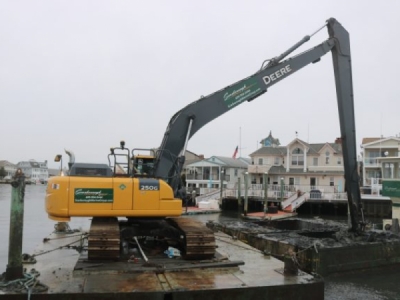
Posted on April 15, 2019
Try to imagine, for a moment, a vast convoy of nearly 1,700 dump trucks rumbling down the highway. And also try to imagine each one of those trucks filled with a load of muddy goo.
That is the rough equivalent of all the soup-like sediment that Sean Scarborough’s dredging company removed from the clogged lagoons in Ocean City and other Jersey Shore communities in the past few months.
Altogether, Scarborough Marine Group dredged 25,000 cubic yards of muck from the back bays while clearing out private boat slips.
Scarborough said some of the lagoons were so clogged with sediment that there was essentially no water in them during low tide, meaning that boats were trapped on mud flats at their own docks.
The dredging work, however, deepened the lagoons by 3 or 4 feet, creating plenty of room for boats to get in and out of the channel.
“They were extremely clogged, but now they’re in much better shape. You went from being dry at low tide to having 3 or 4 feet of water at low tide. It brought accessibility to the back bays,” Scarborough said in an interview Wednesday.

Scarborough Marine Group cleared out private boat slips in Ocean City, Somers Point, Stone Harbor and Cape May until the end of dredging season on March 31. Now that the dredging season is over for the spring, Sean Scarborough has had a chance to look back at his company’s monumental task.
It was a major operation that involved large excavators removing the sediment scoop by scoop. The muck was placed in large floating containers called “hoppers” and then pushed to shore by work boats. Another excavator-like piece of machinery on land was used to load the material from a large container into watertight dump trucks.
Each dump truck carried 15 cubic yards of sediment. In all, nearly 1,700 truckloads were needed to haul away the 25,000 total cubic yards of sediment removed by Scarborough Marine Group.
Scarborough had a deal with a nursery in Corbin City to use the dredge material to replenish the soil there. It was an environmentally friendly way of repurposing the sediment rather than just dumping it in a landfill. The nursery and Scarborough plan to do the same thing for dredging projects next year.
This year, the New Jersey Department of Environmental Protection extended the dredging season to March 31, giving homeowners an extra month to have their boat slips cleaned out.
Private boat slip dredging was an offshoot of Ocean City’s proposed five-year, $20 million dredging program. The city has already dredged several lagoons and channels as it methodically works its way along the entire bayfront.
Boat slip owners are able to piggyback on the city’s dredging permits for their own projects. Under the voluntary program, property owners still have to pay for dredging their slips, but the process relieves them of some of the costs and headaches of doing the work on their own, including finding a disposal site for the sediment.
Ocean City’s multifaceted dredging program is being touted as a model for all New Jersey shore towns dealing with the dangerous problem of sediment-choked waterways.
“Ocean City has been a leader in coming up with innovative solutions to bayside dredging, and all coastal towns will benefit from our work,” Mayor Jay Gillian said in a statement posted on the city’s website in February.

The mayor has made the dredging program a major part of the city’s capital improvement plan. He believes dredging will preserve property values, improve public safety, help the boat owners and marinas and protect the environment.
Scarborough Marine Group was one of the companies that took advantage of the extended dredging season. It dredged boat slips at private homes, marinas and condominium associations all along the back bays.
In Ocean City, it secured exclusive rights to a site at the bay end of 18th Street for its dredging operations this season and next year, too.
Scarborough said his company is already lining up contracts with more homeowners to have their boat slips cleared out when dredging season resumes. He noted there is still plenty of work to do.
“We want to be booked up with all of our dredging for the fall,” he said. “It allows you to run a more efficient operation if you can book your jobs in advance for the fall and winter.”
Although dredging season technically resumes July 1, Scarborough stressed that there is simply too much boating and other recreational activity on the water during the summer tourism season to safely perform the work. His company will wait until things quiet down in the fall.
“We’ll start the day after Labor Day,” he said.

Source: ocnjdaily.com





